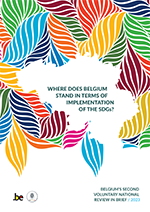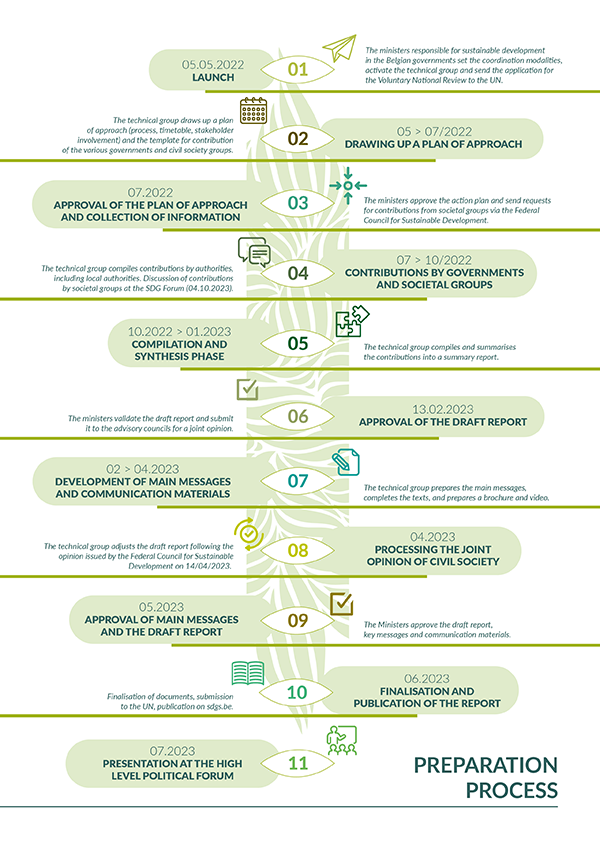The VNR Report
The Voluntary National Review (VNR) is the report submitted by Belgium to the High-Level Political Forum of the United Nations (HLPF) on the implementation of the 2030 Agenda and the Sustainable Development Goals (SDGs).
Discover the report
|
Here you can find |
 |
Belgium’s Voluntary National Review – a collaborative process
The decision to present a second VNR is part of a long-standing commitment to multilateralism and sustainable development by the federal state of Belgium. Since 2007, sustainable development has been enshrined in the Belgian Constitution, ensuring that all policy levels pursue the objectives of sustainable development in its social, economic and environmental aspects in their respective competences.
The implementation of the 2030 Agenda and the SDGs requires a whole of society approach. Besides governments, other important stakeholders including civil society and the private sector have mobilized around the Global Agenda 2030.
The process of the Second Review was established taking into account this whole of society approach. This joint review is the result of a collaborative effort of various policy levels and stakeholders and summarizes how these various policy levels in the federal state of Belgium contribute to the 2030 Agenda and its SDGs. Since the last VNR in 2017, the Court of Auditors has conducted (in 2020) an analysis of the implementation, monitoring and reporting by public authorities in Belgium (Preparedness Review).
In order to make the process as inclusive as possible, the Federal Council for Sustainable Development (CFDD-FRDO) was tasked with serving as the focal point for engaging various social groups, under the motto of "Leave No One Behind”: worker and employer organizations, scientists and researchers, and young people. These groups were involved in two phases. In the first phase, a summarized overview of the SDG implementation of these groups was compiled, after which a significant space was devoted to it in the VNR itself. In the second phase, joint recommendations by several advisory councils were requested on the draft version of the VNR.
On this website you will find the full contributions from all actors who have participated:
Strengths, challenges and policies
Governments in Belgium start from a privileged position given, among other things, the strong institutional framework regarding sustainable development. With a strong economy, high-quality education and relatively low income inequality, governments have the opportunity to pursue sustainability initiatives, both internally and externally.
Through international actions, governments in Belgium are contributing to achieving the SDGs abroad. Global sustainable development has long been a shared commitment: promotion and protection of human rights, effective and inclusive multilateralism, international solidarity, eradicating poverty, combating climate change and reducing inequalities. This commitment was reflected, for example, in the Belgian response to the COVID-19 pandemic, as well as the sixth Belgian mandate in the UN Security Council in 2019-2020 and the focus on climate security and children in armed conflict. Queen Mathilde's role as an SDG Ambassador also reflects this commitment.
This second VNR illustrates that governments in Belgium have adopted many policy initiatives that contribute positively to the SDGs, though many challenges also lie ahead of us.
National statistics show that time is running out. In 2022, Belgium was on track to meet the targets for only 20 of the 51 indicators examined. An annex to this VNR shows the evolution since 2000 of a comprehensive list of indicators in more detail, at the national and regional levels.
Key challenges for implementing the 2030 Agenda include, of course, the consequences of the COVID-19 pandemic, which is the theme of this year's HLPF, as well as increasing geopolitical uncertainty, the climate crisis and biodiversity loss, social inequalities, the link between digitalization and sustainable development, and the central role of education. These challenges can also present opportunities that must be seized.
In their contributions, civil society groups ask for, among other things, greater coherence in the way that different policy levels monitor the implementation of the SDGs and their targets. This means not only regard for internal Belgian policy coherence, but also coherence with the European and international context, given the economic, ecological and social impact across borders.
This VNR shows that the various governments in Belgium and actors involved remain committed to the SDGs by continuing and strengthening existing efforts to live up to the Decade of Action of Sustainable Development as called for by the UN Secretary-General.
Preparation Methodology and Process
The preparation of the Voluntary National Review was coordinated within the Interministerial Conference on Sustainable Development (IMCSD). A technical working group made up of experts from the administrations of the different entities coordinated the contributions of the entities under the chairmanship of the Federal Institute for Sustainable Development (FISD).
The members of the IMCSD agreed on the following guidelines:
- Content: a balance between the various dimensions of sustainable development, its internal and external components, a fair and critical assessment of the achievements, attention for the universal, transformative and holistic nature of Agenda 2030, a presentation of the indicators for monitoring the SDGs and a presentation of the evolution and new ambitions since 2017;
- Structure: a table of contents based on the guidelines proposed by the United Nations; a synthetic approach was chosen, in which the VNR presents the essential elements of the contributions of the governments to the SDGs, and refers to an appendix that includes the detailed contribution of the various entities.
- Process: involving the various government agencies and organized civil society groups from the outset, to feed the report.
From July 2022, the various governments and civil society actors received a request for contributions. In this regard, the Federal Council for Sustainable Development sought input from members of the main advisory councils. It also took into account the 'Leave No One Behind' principle and contacted a specific list of organizations representing the most vulnerable social groups.
From July 2022, the various governments and civil society actors received a request for contributions. In this regard, the Federal Council for Sustainable Development sought input from members of the main advisory councils. It also took into account the 'Leave No One Behind' principle and contacted a specific list of organizations representing the most vulnerable social groups.
During the SDG Forum, which took place on 4 October 2022, these contributions were finalised. Organized by about 20 partner organizations from all areas of the sustainable development sector, the SDG Forum is the first multi-stakeholder forum on the SDGs in the Benelux. Its objective is to connect organisations from a wide range of sectors through a series of workshops, plenary sessions and panel debates. The Forum offers policymakers, companies, NGOs and academics the chance to meet and exchange SDG ideas and solutions.
These contributions have since been published on the website www.sdgs.be and summarised in a draft report. The contributions of the organized civil society groups are an integral part of the Voluntary National Review, in addition to the contributions of the governments, and a clear distinction is made in the text in this regard.
In early 2023, we submitted the draft report to the main advisory councils of civil society. At the request of the Interministerial Conference on Sustainable Development, the Federal Council for Sustainable Development drafted joint recommendations with other advisory councils. In May 2023, the conference considered the final approval of the VNR.
